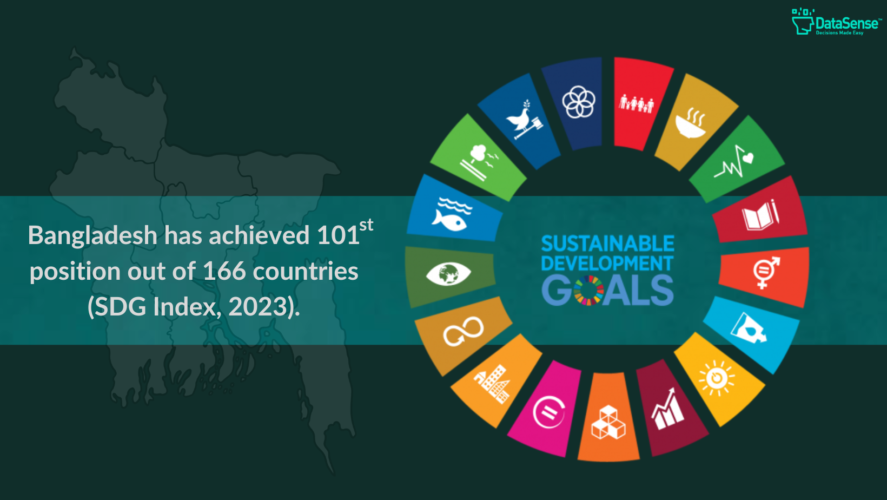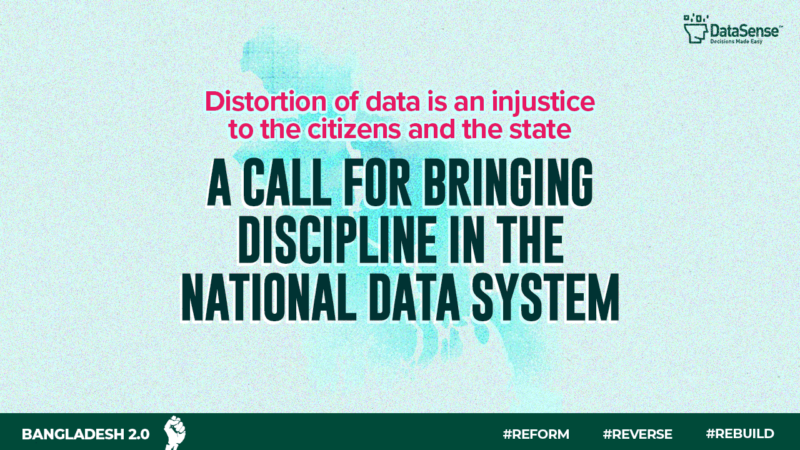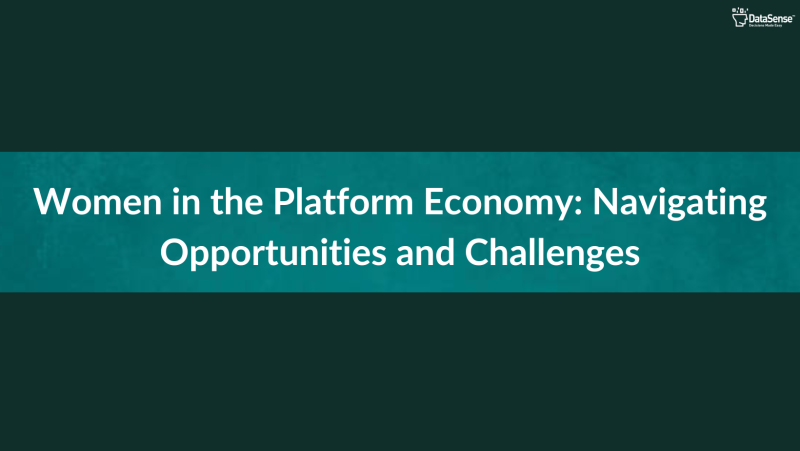Assessment of Progress of Bangladesh Towards Achieving the Sustainable Development Goals (SDGs)

Author: Jinat Jahan Khan
Bangladesh has accomplished a remarkable development in achieving Sustainable Development Goals (SDGs). In the SDG Index 2023, the country has achieved the 101st position out of 166 countries on the sustainable development report. It has achieved an overall score of 65.9 out of 100. In the previous year, the score was 64.22%. In South Asia, Bangladesh is ahead of India (112th) and Pakistan (128th) as per this year’s report. On the contrary. it has gained the 46th position on the spillover index. Bangladesh has achieved a score of 97.8 on this index, indicating that it has substantially more positive effects on the achievement of SDGs (Ali, 2023). The country targets to graduate from the group of the Least Development Countries (LDCs) by 2026 and achieve the Sustainable Development Goals (SDGs) by 2030 (Rahman, 2023). Here is a summary of the progress of Bangladesh in all 17 SDG goals.
SDG 1 to SDG 6
Over the last 30 years, Bangladesh has shown a decreasing trend in poverty. In 2010, the population below the international poverty line was 18.22 percent, which reduced to 13.47 percent in 2016. Even after a decent improvement in poverty alleviation, there are still challenges remaining in achieving the SDG 1 goal (No poverty). According to the Household Income and Expenditure Survey 2022, Bangladesh has been witnessing reduced poverty even after the COVID-19 pandemic. However, income equality is still high. The top 10% of the population in this country holds around 41% share of the national total income (Rahman, 2023). On the other hand, undernourishment has decreased to 9.7 percent in 2020 from 16.4 percent in 2016. However, the scenario of hunger is quite diverse in this country. In the northern Rangpur division, the incidence of poverty is still very poor and women and children still suffer from malnutrition due to food shortages. As per the Global Hunger Index 2022, Bangladesh is at the 84th place among 121 nations (Global Hunger Index, 2022). Despite this country’s moderately good performance in South Asia, Bangladesh still has significant challenges such as rising prices of commodities, decreasing agricultural lands, and increasing income inequalities that are constraints to achieving SDG 2 (Zero hunger). On the contrary, SDG 3 (good health and well-being) has faced a serious threat after the COVID-19 pandemic. Besides the issues related to the infection of COVID-19, the pandemic has affected family planning, child vaccination, cancer screening, and so on (Islam et al., 2020). As per the SDG Index 2023, this goal has major challenges, but the situation is moderately improving.
SDG goal 4 (Quality education) is one of the two SDG goals on which Bangladesh is on track or maintaining the SDG achievement. In this country, the completion rate for primary-level education in Bangladesh is 82.6 percent. It is 64.7 percent for lower secondary education level, and 29.4 percent for upper secondary education as per the Multiple Indicator Cluster Survey (MICS) 2019. There is a significant increase in the participation rate of youth and adults in formal training and secondary education (MICS, 2019). According to the Global Gender Gap Report 2022, Bangladesh has secured 71st position among 146 countries in terms of gender equality. Domestic violence and child marriage have been observed to increase after the COVID-19 pandemic (Bani, 2021). Though it has fallen six places from the previous year, it is still the best-performing country in South Asia. According to the SDG dashboard, the related goal of this topic, SDG 5 (Gender equality) has a stagnating trend in the case of Bangladesh. While Bangladesh has progressed towards achieving the indicators of SDG 6, major challenges have remained as the country depends on limited groundwater sources and there is a high vulnerability to climate change (Sustainable Development Report 2023; SDG Bangladesh Progress Report, 2023).

SDG 7 to SDG 12
Bangladesh has achieved a milestone by bringing 100 percent of the population under the electricity coverage in 2022, which was 90 percent in 2018. And it shows a moderately improving trend on the SDG dashboard. However, there are some difficulties such as an investment of about USD 35 billion only in the power generation sector is needed, the system loss of transmission and distribution, and so on. The next SDG goal related to Decent work and economic growth (SDG 8) is stagnating as per the SDG Index 2023. This country has seen a substantial increase in GDP per capita based on PPP to USD 6,613 in 2021 from USD 849.6 in 1990. However, many important issues of SDG 8 have remained unsolved. Poor and unsafe working environments especially in the RMG industry have caused a significant number of industrial disasters which have taken hundreds of workers. And the COVID-19 pandemic has also been a big blow to the core principles of this goal. SDG 9 (Industry, innovation and infrastructure) is based on three interconnected pillars including infrastructure, industry, and innovation. Issues with the implementation of SDG 9 in Bangladesh include the high cost of doing any business, lack of skilled human resources, lack of quality infrastructure, and shortcomings in accountable and transparent institutions. For implementing SDG 10 (Reduced inequalities), three major challenges are measurement, aggregation, and localisation challenges. According to the Social Progress Index 2022, Bangladesh is a ‘low social country’ with a rank of 119 across 169 countries. In the dimension of basic human needs, it has achieved a 112th position. It has ranked 121st in the foundation of well-being dimension and 124th in the opportunity dimension (Sustainable Development Report 2023; SDG Bangladesh Progress Report, 2023).
On the other hand, there are multiple challenges to implementing SDG 11 (Sustainable cities and communities). Due to rapid and unplanned urbanisation, about 47 percent of the population in urban areas lives in slums (World Bank, 2020). Overpopulated cities, declining urban environment quality, poorly designed transportation systems and lack of governance have led to a decreasing trend in sustainable cities and communities (SDG 11). SDG 12 (Responsible consumption and protection) is one of the two SDG goals that has already been achieved by Bangladesh. Under the initiative of building smart cities, smaller cities are targeted to convert them into smart cities with the rapid development of composting, recycling, and reusing of wastes. Jashore City and Sylhet City Corporation have been promoting the green city concept. However, challenges remain in the case of large metropolises such as Dhaka and Chattogram (Sustainable Development Report 2023; SDG Bangladesh Progress Report, 2023).
SDG 13 to SDG 17
As per the SDG Index 2023, another SDG goal that is achieved in Bangladesh is SDG 13 (Climate change). Bangladesh is one of the most climate-vulnerable countries, but it is also one of the most resilient countries as well. The country faces frequent disasters. Around 70 percent of the total land mass is prone to flooding. Bangladesh requires multi-prone strategies as most of the disasters are climate-related here. The next three goals e.g., SDG 14 (Life below water), SDG 15 (Life on land), and SDG 16 (Peace, justice and strong institutions) have a decreasing trend as per the index. As a developing country with a natural diversity, there is a need for more green technologies to harness and preserve natural resources. Lastly, SDG goal 17 observes the resources and partnerships in three main areas including economy, society and biosphere. The trend of this goal is stagnating. But as Bangladesh targets to have a sustainable LDC graduation by 2026, it has been trying to bring efficiency in project management and improve coordination among different stakeholders and agencies. (Sustainable Development Report 2023; SDG Bangladesh Progress Report, 2023)
In conclusion, only in SDG 4 (Quality education) and SDG 12 (Responsible consumption and production), Bangladesh is on track or maintaining SDG achievements. According to the SDG dashboard, it has only achieved two SDG goals such as SDG 12 (Responsible consumption and production) and SDG 13 (Climate action) till now. Even though it has achieved the climate action goal, there are still some challenges remaining to combat climate change. Even for some goals, there is a decreasing or stagnating trend, which is quite concerning. There is a need for more endeavours from all stakeholders to achieve all the 17 SDG goals in the case of Bangladesh (Rahman, 2023).
References
Ali, M. (2023). SDG Index 2023: Bangladesh ahead of India, Pakistan. The Business Standard. https://www.tbsnews.net/economy/sdg-index-2023-bangladesh-ahead-india-pakistan-654006
BANGLADESH MICS 2019 REPORT: KEY FINDINGS – UNICEF MICS. (2020). Retrieved from mics.unicef.org website: https://mics.unicef.org/news_entries/152/BANGLADESH-MICS-2019-REPORT:-KEY-FINDINGS
Global Hunger Index (Bangladesh). (2022). Retrieved from Global Hunger Index (GHI) – peer-reviewed annual publication designed to comprehensively measure and track hunger at the global, regional, and country levels website: https://www.globalhungerindex.org/bangladesh.html
Islam, Md. T., Talukder, A. K., Siddiqui, Md. N., & Islam, T. (2020). Tackling the COVID-19 pandemic: the Bangladesh perspective. Journal of Public Health Research, 9(4). https://doi.org/10.4081/jphr.2020.1794
Rahman, M. (2023). Lessons for Bangladesh as a graduating LDC. The Daily Star. https://www.thedailystar.net/supplements/32nd-anniversary/towards-smart-bangladesh/news/lessons-bangladesh-graduating-ldc-3243446
Rahman, S. (2023). Multidimensional Poverty Index 2023: How relevant is it for Bangladesh? Retrieved from The Business Standard website: https://www.tbsnews.net/features/panorama/multidimensional-poverty-index-2023-how-relevant-it-bangladesh-665370
Sustainable Development Report 2022. (2023). Retrieved from dashboards.sdgindex.org website: https://dashboards.sdgindex.org/profiles/bangladesh/indicators
Sustainable Development Goals Bangladesh Progress Report 2022. (2023). Retrieved from Bangladesh Planning Commission website: https://gedkp.gov.bd/wp-content/uploads/2023/02/SDGs-Progress-Report-2022-Final-output-file-1-February-2023-Full-book_compressed.pdf?post_id=3032
![]()



